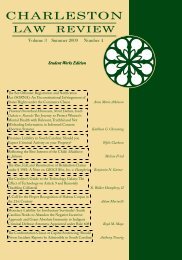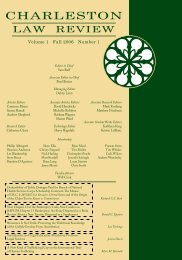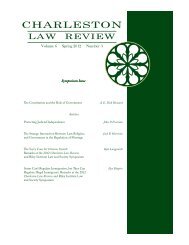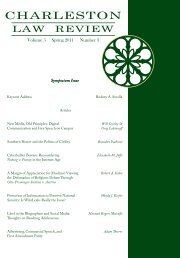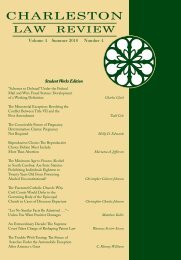Volume 5 Winter 2011 Number 2 - Charleston Law Review
Volume 5 Winter 2011 Number 2 - Charleston Law Review
Volume 5 Winter 2011 Number 2 - Charleston Law Review
You also want an ePaper? Increase the reach of your titles
YUMPU automatically turns print PDFs into web optimized ePapers that Google loves.
SCHULZE FINAL.doc1/20/<strong>2011</strong> 6:14PM<strong>2011</strong>] <strong>Law</strong> School Academic Supportmany law schools are implementing for-credit and graded barpreparation courses for students. 54 California Western School of<strong>Law</strong> (CWSL), for instance, has implemented such a program. 55“CWSL’s pre-bar review course introduces students to the barexamination. It continues to refine students’ essay and multiplechoiceexam-taking skills, as well as introducing students to theperformance exam.” 56EDUC. &ADMISSIONS TO THE BAR, AM. BAR ASS’N, REPORT TO THE HOUSE OFDELEGATES, at 1, 1 (2008), available at http://www.abanet.org/legaled/standards/noticeandcomment/%2044118_%201.DOC. That interpretation hadprovided that: “If a law school grants academic credit for a bar examinationpreparation course, such credit may not be counted toward the minimumrequirements for graduation established in Standard 304. A law school may notrequire successful completion of a bar examination preparation course as acondition of graduation.” Id. at 2. With its deletion, schools are now free toprovide credit for such courses and require them for graduation. See LeighJones, More Schools Offer Bar Prep Courses, NAT’L L.J. (Sept. 10, 2008),http://www.law.com/jsp/article.jsp?id=1202424397151.54. See E-mail from James A. Janda, Dir., Peer Mentoring & BarPreparation Programs, Suffolk Univ. <strong>Law</strong> Sch., to author (Aug. 4, 2009, 12:17CST) (on file with author) [hereinafter Janda E-mail]; see also Schulze, supranote 52, at 245 (“[M]any schools have created for-credit and/or graded barcourses . . . .”).55. California Western Bar <strong>Review</strong> Program, CAL. W.SCH. L.|SAN DIEGO,http://www.cwsl.edu/main/default.asp?nav=academic_support.asp&body=academic_support/Bar<strong>Review</strong>Homepage.asp (last visited Oct. 21, 2010).56. Id. Through various ASP contexts, many schools require or stronglyrecommend ASP courses to students who have struggled academically in lawschool. This raises the issue of whether requiring struggling students to takean ASP class will lead to stigma, thus leading to the self-fulfilling prophecyeffect discussed previously. See supra notes 34–36 and accompanying text.Although bar preparation courses are unlikely to face this problem becausestudents across the GPA range are likely to enroll in the class, ASPprofessionals teaching for-credit or graded courses open only to those onacademic probation must deal with the “stigma” issue. See Schmidt & Iijima,supra note 33, at 675–76 (suggesting law professors focus on students’analytical skills to decrease the remedial nature of the program and reduce theassociated stigma). If such a course is open only to students in the bottom ofthe class, simply entering the classroom discloses to all other participants theacademic status of every other participant. In other words, everyone in theroom knows that everyone else is in the bottom of the class.As a result, some ASP professionals shy away from required ASPclasses or those open only to students on academic probation. Many schoolsinstead focus on private, individual academic counseling for such students, thusensuring confidentiality and a lack of institutionally created “outing.” On theother hand, the classroom environment has distinct advantages which287



